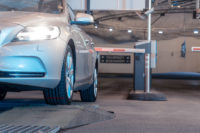Rubber bitumen plant to ‘eat’ 500,000 car tyres a year
Hungarian oil and gas company MOL Group is setting up a new rubber bitumen plant in Zalaegerszeg, in the west of the country. A foundation stone for the facility was laid in May; when complete next year, it will be able to produce 20,000 tonnes of rubber bitumen for road building applications.
The patented technology used to produce the substance results from a collaboration between MOL and the University of Pannonia in Veszprém, Hungary. The new HUF 3 billion (£8.2 million) plant will have the capacity to utilise around half a million end of life car tyres annually to produce 3,000 tons of crumb rubber for the process. MOF notes that this amount represents some eight to ten per cent of Hungary’s annual tyre waste. The crumb rubber will be used to produce up to 20,000 tons of rubber bitumen a year. Operating at full capacity, the plant could therefore provide the materials to build 200 kilometres of road (single lane in each direction) or to resurface 600 kilometres of road.
According to MOL, its rubber bitumen can be used to build more durable asphalt roads that have a higher load capacity and lower maintenance costs. The company observes that the material’s durability is “well illustrated” by the fact that no pothole exists on any of the roads made with its rubber bitumen so far, even though the oldest experimental roadway is now 15 years old.
MOL is financing 75 per cent of the project costs from its own funds and the remaining quarter is being financed through the Hungarian government’s Enterprise Investment Support Program.
“The Hungarian government grants HUF 750 million support to MOL within the framework of the Enterprise Investment Support Program. The construction of MOL Group’s new plant contributes to better quality roads in Hungary,” said Mihály Varga, Hungary’s Minister of Finance, at the foundation stone-laying ceremony.
Zsolt Hernádi, chairman and chief executive officer of MOL Group, points out that the company is the only entity in Central and Eastern Europe with a patent to the rubber bitumen technology that will be used. He sees clear benefits in using this particular technology: “The cost of the road made with rubber bitumen can be lowered by 30 per cent during its 30-year lifecycle.”
MOL has operated a 5,000-ton capacity rubber bitumen plant in the region since 2012. The new facility, which is being built in response to increased demand for rubber bitumen, will secure refinery jobs for some 100 workers.
The use of rubber bitumen for road building slowly taking off in Hungary. MOL shares that 60 kilometres of road within the country have been built or resurfaced using rubber bitumen in the past six years. Around 150,000 end of life car tyres were utilised.




Comments